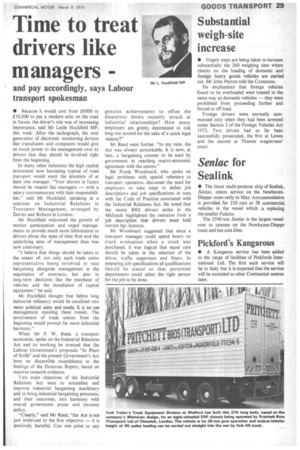Time to treat drivers like managers
Page 31

If you've noticed an error in this article please click here to report it so we can fix it.
and pay accordingly, says Labour transport spokesman
• Because it would cost from £6000 to £10,000 to put a modern artic on the road in future, the driver's role was of increasing importance, said Mr Leslie Huckfield MP, this week. After the tachograph, the next. generation of electronic monitoring devices like transducers and computers would give so much power to the management over its drivers that they should be involved right from the beginning.
In many other industries the high capital investment now becoming typical of road transport would merit the attention of at least one manager. "Your drivers in future should be treated like managers.— with a salary commensurate with their responsibilities," said Mr Huckfield, speaking at a seminar on Industrial Relations in Transport Management, arranged by Davies and Robson in London.
Mr Huckfield welcomed the growth of worker participation and urged managements to provide much more information to drivers about the state of their firm and the underlying aims of management than was now customary.
"I believe that things should be taken to the extent of, not only each trade union representative being involved in rate bargaining alongside management in the negotiation of contracts, but also in long-term decisions like the ptirchase of vehicles and the installation of capital equipment," he said.
Mr Huckfield thought that before long industrial militancy would be canalized into more political aims and needs. It is no use management resisting these trends. The involvement of trade unions from the beginning would prompt far more industrial harmony."
When Mr P. W. Reed, a transport economist, spoke on the Industrial Relations Act and its working he stressed that the Labour Government's proposals "In Place of Strife" and the present Government's Act bore no discernible resemblance to the findings of the Donovan Report, based on massive research evidence.
Two main objectives of the Industrial Relations Act were to streamline and improve industrial bargaining machinery and to bring industrial bargaining processes, and their outcomes, into harmony with overall government prices and incomes policy..
"Clearly," said Mr Reed, "the Act is not just irrelevant to the first objective — it is positively harmful. Can one point to any genuine achievements to offset the disastrous blows recently struck at industrial relationships? How many employers are grimly determined to risk long-run accord for the sake of a quick legal victory?"
Mr Reed went further. "In my view, the. Act was always unworkable. It is now, at best, a bargaining counter to be used by government in reaching macro-economic agreement with the unions."
Mr Frank Woodward, who spoke on legal problems with special reference to transport operation, discussed the need for employers to take steps to define job descriptions and job specifications in tune with the Code of Practice associated with the Industrial Relations Act. He noted that the recent BRS drivers strike in the Midlands highlighted the omission from a job description that drivers must hold current hgv licences.
Mr Woodward suggested that since a transport manager could spend hours on truck evaluation when a truck was purchased, it was logical that equal care should be taken in the selection of the driver, traffic supervisor and fitters. In preparing job specifications all qualifications should be stated so that personnel departments could select the right person for the job to be done.




















































































































































